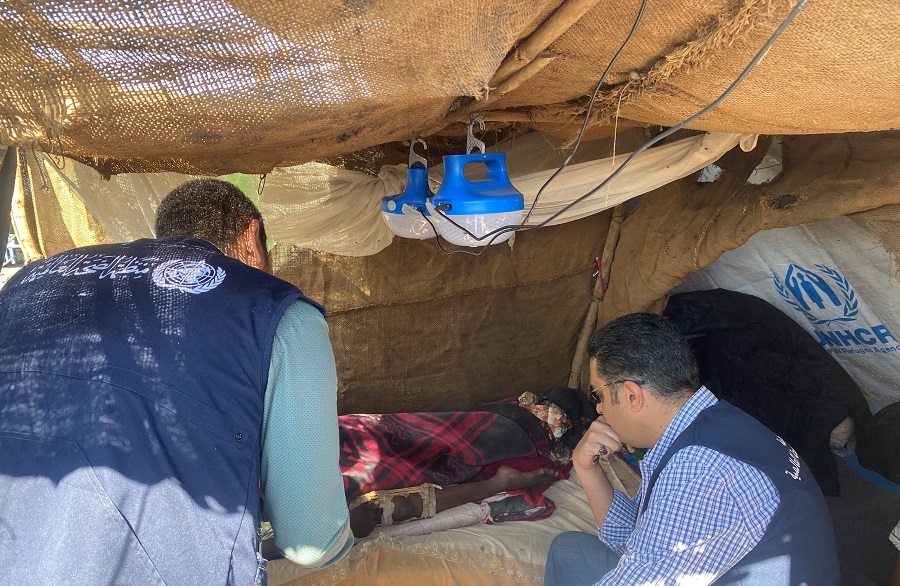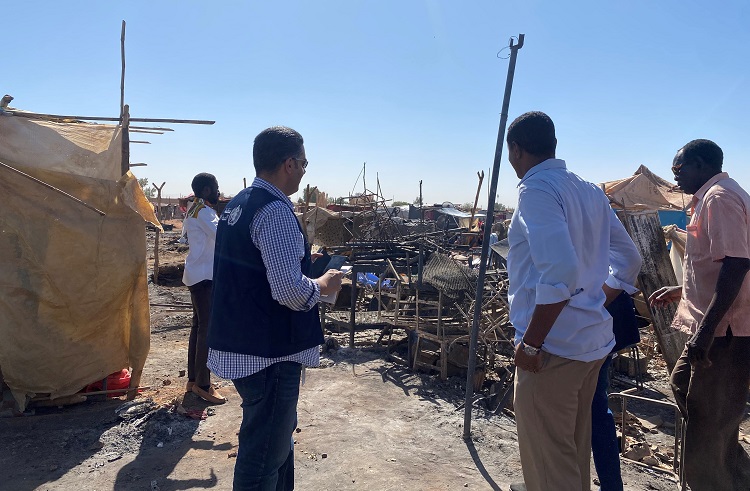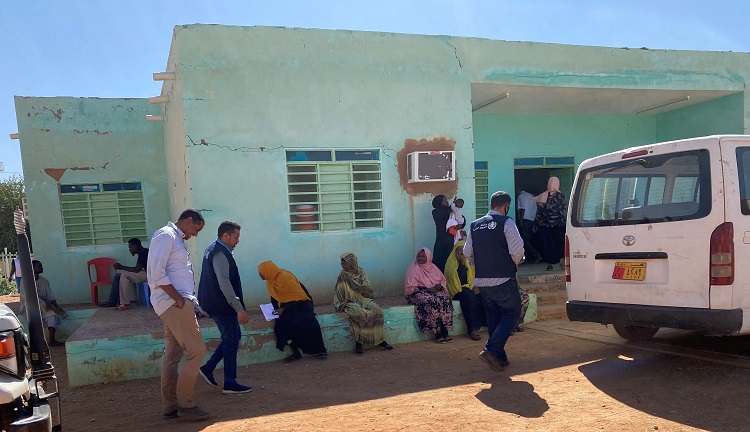 Among the ravages caused by the fire, burn and fracture wounds were sustained by many inhabitants of the Al-Takamol Refugee Camp. 22 January, 2023, Sudan. Credit: WHO/Ali Raja
Among the ravages caused by the fire, burn and fracture wounds were sustained by many inhabitants of the Al-Takamol Refugee Camp. 22 January, 2023, Sudan. Credit: WHO/Ali Raja
7 February 2023 – Over 450 refugee families in Sudan faced a harrowing evening on 17 January, 2023, when their Al Takamol camp was engulfed by fire, leading to one death, several injuries with burns and fractures, and the destruction of their belongings, among other vital damage. Almost half of the 2000 individuals residing in the camp are children, while 32% are older people. A joint team was swiftly dispatched by the Khartoum State Ministry of Health and WHO Sudan – the first UN responder to support health services in the incident – for a rapid situation analysis and the extension of needed assistance.
An immediate response
Khaled Ibn Al Waleed clinic, the refugee camp’s nearest public health centre located one kilometre away, only began operations after the fire thanks to Al Manar nongovernmental organization, which provided basic resources for its partial functioning. The only available doctor in the clinic struggled to provide minimum standard services, with limited resources.
In response to the fire, the WHO Health Emergencies Programme supported Khartoum State Ministry of Health with extensive emergency supplies, including medicine, trauma and surgery kits. WHO will also cover the clinic’s staffing needs for 2 doctors, 2 nurses, 2 medical assistants, 2 laboratory technicians, 2 pharmacists, 2 health promotors, a monitoring and evaluation officer, a nutritionist, an ambulance driver and another driver for pick and drop.
Khartoum’s State Ministry of Health has delivered the required medicines and equipment and has committed a standby ambulance for referral of critical cases, as well as a continuous supply of medicines and other consumables, both for a one-month duration.
 Rapid situation analysis of the Al-Takamol Refugee Camp health needs conducted by a joint team from WHO Sudan and the Khartoum Ministry of Health. 22 January 2023, Khartoum, Sudan. Credit: WHO/Ali Raja
Rapid situation analysis of the Al-Takamol Refugee Camp health needs conducted by a joint team from WHO Sudan and the Khartoum Ministry of Health. 22 January 2023, Khartoum, Sudan. Credit: WHO/Ali Raja
In a challenging situation
Established 12 years ago following South Sudan's declaration of independence, Al Takamol Refugee Camp is one of many scattered in all localities of Khartoum State. Due to the length of the camp’s existence, non-welcoming neighbours impact the availability of essential resources, while substantial security concerns plague its residents.
Among the camp’s biggest challenges is water, with neighbours continuously opposing repeated attempts by the Sudanese Humanitarian Fund to install large water tanks within the camp. Residents are thus forced to purchase water from local sellers on mobile tanks, resulting in the constant threat of waterborne disease outbreaks due to unmonitored water quality. Open garbage piles leading to compromised hygiene also contribute to the refugees’ precarious sanitation and poor living conditions.
Ongoing disagreements among the camp’s refugees further complicate humanitarian action, with resistance committees, sultans and opposition forces rendering support from nongovernmental organizations and UN agencies much harder to extend to its vulnerable population.
But sustainable needs remain
Nevertheless, the findings of the rapid assessment team dispatched after the fire confirmed the dire security need to safeguard both health care workers and medicine storage. Safety precautions are equally pertinent, requiring the installation of fire extinguishers all around the camp. As for concerns for water and sanitation, additional latrines and a continuous supply of drinking-water enabling water quality monitoring are also vital.
In the absence of public health services within the Al Takamol Refugee Camp, sustainable support for the adjacent Khaled Ibn Al Waleed clinic with basic laboratory equipment, IV stands, nebulizers, oxygen concentrators and trauma equipment, is necessary. Similarly, health promotion activities need to be initiated to minimize the spread of disease and increase public awareness about the importance of seeking proper medical care. With a traumatic event such as fire ravaging the only place these 2000 refugees have called home in 12 years, mental health needs must also be addressed.
While UNHCR had supported the camp’s refugees on several occasions, the main ongoing actions are carried out by Al Manar and Sudanese Red Crescent volunteers. According to the joint WHO-Khartoum State Ministry of Health mission, a more detailed inter-agency assessment covering all sectors is in order for this long-standing camp.
Sudan hosts one of the largest refugee populations in Africa, with an 80% majority hailing from South Sudan. Many others fled violence and persecution in neighbouring countries, including Eritrea, the Central African Republic, Ethiopia, and Chad, along with the crises in Syria and Yemen pushing people to seek safety in Sudan.
 The joint assessment team also visited the Khaled Ibn Al Waleed clinic, the only nearby public health center available for residents of the Al-Takamol Refugee Camp. 22 January 2023, Khartoum, Sudan. Credit: WHO/Ali Raja
The joint assessment team also visited the Khaled Ibn Al Waleed clinic, the only nearby public health center available for residents of the Al-Takamol Refugee Camp. 22 January 2023, Khartoum, Sudan. Credit: WHO/Ali Raja








